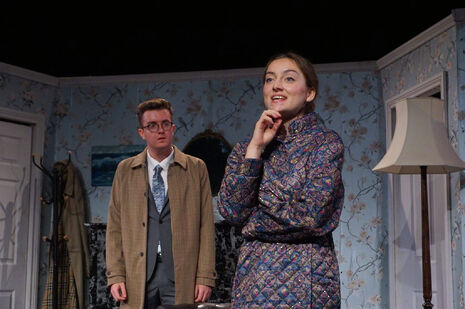The Deep Blue Sea: a compelling exploration of passion, repression and desire
Mariam Abdel-Razek’s production is slow to get going, but provides an emotional punch for it’s audience

Content note: This article includes detailed discussion of suicide and brief mentions of alcoholism.
The Deep Blue Sea brings a wealth of emotion and anguish to Week 1 at the ADC Theatre as the Brickhouse Theatre Company takes on Terence Rattigan’s timeless story of loss, repressed desire and heartbreak. Although suffering from some energy problems in the first act, this production succeeds in delivering complex devastation and pain, particularly driven by Clara Morel’s stellar turn as Hester.
Rattigan’s mid-century masterpiece invites the audience into the sitting room of Hester Collyer’s (Clara Morel) flat, where we find Hester in the aftermath of a failed suicide attempt and are introduced to her well-meaning neighbours and landlady. The anguish that led to such an attempt soon becomes clear as we meet the two men in her life. Ross Guinea-McIntyre plays William Collyer, Hester’s estranged High Court judge husband, with Ben Galvin as Freddie Page, the ex-test pilot and slight alcoholic whom Hester is irrevocably in love with. The reality of Freddie and Hester’s once passionate relationship is painfully exposed throughout the play as Hester struggles to cope with the cooling of Freddie’s feelings.
“The production benefits from a strong ensemble but it is Morel’s performance that packs the emotional punch of the play as she really shines in this brilliantly complex role.”
This is a play about the devastation that love can bring, evoking themes of repressed passion, loneliness and desire, feelings that Director Mariam Abdel-Razek's production captures exceptionally well. These were emotions that Rattigan himself knew all too well, having lost his lover, Kenny Morgan, to suicide three years before the play debuted in 1952, leading many to suggest that Hester’s story of forbidden love is based on the real illegal homosexual relationship between Morgan and Rattigan. The cast and production team, seem to hone in on such elements of Rattigan’s script, hitting the notes which make The Deep Blue Sea such a raw and affecting play.
This is most clear in Morel’s starring performance, as she expertly expresses Hester’s agony and fragility through her entire body. She does well to balance the tensions in Hester’s character; she is an elegant, well-spoken young woman who is falling to pieces inside. Morel nails the 1950s accent crystal clear and sweet, without being cloying at all, while her panicked and despairing expressions reveal what’s really going on in her head. Most striking are the moments where you can literally see Hester’s world crumble; her heartbreak etched in every tiny movement of her cigarette, in every short breath. One exchange between Hester and Freddie on the telephone is particularly well directed and performed. The production benefits from a strong ensemble but it is Morel’s performance that packs the emotional punch of the play as she really shines in this brilliantly complex role.
Guinea-McIntyre and Galvin are excellent as Hester’s husband and lover, although their best performances seem concentrated in the second act. They both effectively convey the contrasts between the two men: William is gentle, sympathetic but buttoned up, while Freddie is more rash and narcissistic. The difference that matters, however, is their different types of chemistry with Hester. In stuffy mid-century Britain, passion (or lack of it) comes across in the simplest of touches, clear from the way that Galvin and Morel hold each other or the way that Guinea-McIntyre flinches as Morel tries to kiss him on the cheek. These small moments are crucial to the delicate dynamics between characters, making for an interesting exploration of desire, reciprocal or otherwise.
The Deep Blue Sea is anchored in the middle-class claustrophobia of 1950s Britain by the supporting characters who do not have the right tools to be able to understand and listen to her plight. Eliz Avni, Leon Hewitt and Juliet Martin play the landlady and neighbours who discover her as the play begins, their extreme discomfort providing a window into the general societal attitude to suicide and unconventional relationships like Hester and Freddie’s. Such performances and the beautiful costumes situate the play in Rattigan’s Britain from the very opening. However, these initial moments don’t quite land as powerfully as they maybe should, giving the show a slow start and falling short of the required energy for such a distinctive opening sequence. This is partly due to staging choices which don’t quite work, as the characters flurry about the stage, dialogue moving off-stage and on-stage in a way that loses the intensity of the moment. This energy problem is rectified as the play continues, giving characters like Rowan Gow’s Jackie and Sophie Kean’s Mr Miller more space to offer their insights.
This production is characterised by the almost overwhelming volume of pain visible in the central three characters, creating a powerful piece of theatre. The overall energy builds slowly, leaving the opening somewhat slow and lacking in impact but really hitting every mark as the second act gets underway. This is clearly a talented company with an aptitude for nuanced moving performances, but Morel stands out as a clear star in her portrayal of Hester and carries the bulk of the play’s emotional weight.
 News / Report suggests Cambridge the hardest place to get a first in the country23 January 2026
News / Report suggests Cambridge the hardest place to get a first in the country23 January 2026 News / Reform candidate retracts claim of being Cambridge alum 26 January 2026
News / Reform candidate retracts claim of being Cambridge alum 26 January 2026 News / Cambridge ranks in the top ten for every subject area in 202623 January 2026
News / Cambridge ranks in the top ten for every subject area in 202623 January 2026 Comment / Cambridge has already become complacent on class23 January 2026
Comment / Cambridge has already become complacent on class23 January 2026 News / Palestine activists project slogans onto John’s24 January 2026
News / Palestine activists project slogans onto John’s24 January 2026









